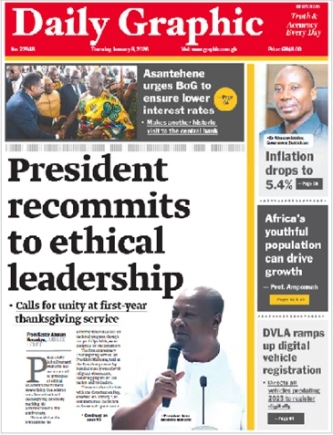Trade and development – making a difference to Ghana
In December, on a tropical island in Indonesia, the “Bali Package” was unanimously agreed at the 9th Ministerial Conference of the World Trade Organisation (WTO).
The package includes an agreement on trade facilitation, which aims to cut red tape and inefficiencies at borders.
Trade facilitation makes the business of trading easier, quicker and cheaper and can therefore provide a critical boost for developing economies. But what difference will it make to Africa?
Across the world there are enormous challenges in trading and getting goods to market. According to the African Development Bank, some of the longest custom delays occur here in Africa.
Once through, there can be further obstacles to negotiate on the other side of the border; on the highway between Lagos and Abuja there are 69 official checkpoints.
These challenges increase costs for businesses, raise prices for consumers and undermine the investment needed to create jobs and reduce poverty. Those attempting to trade lose money while goods perish. Others cannot afford the risk so don’t bother at all. Sadly, the problem is particularly acute in developing countries.
Trade is important for lasting growth. The World Bank has estimated that over recent decades, income grew three times faster in developing countries that opened up their markets than in those that maintained barriers to trade; and it’s not just businesses that stand to gain.
Households also benefit from cheaper products with more efficient borders, especially food and other agricultural goods that make up the majority of outgoings in low-income homes.
The UK’s approach to trade and development is two-pronged: improving market access for poor countries and ensuring that they can take advantage of this access.
Our aim is to help developing countries tackle domestic barriers to trade such as ineffective institutions, poor infrastructure, complex regulations and a lack of skills. Trade is ever more important for Ghana too.
Increased regional trade and further progressive integration into global value chains will promote long-term prosperity.
Creating an environment where businesses can thrive and consequently create the kind of jobs and investment that will lead to long-term growth is the overriding ambition of the Ghana/UK High Level Prosperity Partnership.
I launched this important initiative last year, and working closely with the Honourable Minister Hanna Tetteh, the partnership had already laid a strong foundation for increased economic cooperation between Ghana and the UK.
Through working in partnerships with the government, the private sector and engaging with civil society, the UK is committed to continuing to contribute to Ghana’s ongoing development.
For example our G8 Extractives Partnership has been designed to share expertise to enable Ghana’s oil and gas sector to develop in line with international best practice.
We are deepening cooperation in the financial services industry by hosting an investment forum in London and organising an inward trade mission to Ghana with British businesses in the coming months. Large-scale UK investments in the western region, such as Tullow’s T.E.N field and Lonrho’s Atuabo Freeport create real opportunities to catalyse growth in Ghana’s SME sector.
We are collaborating on programmes that will upskill the surrounding communities to generate employment and play a part in Ghana’s growing oil and gas industry. DFID Ghana is implementing an institutional development programme to share skills aimed at managing private sector investment in infrastructure.
And this year, we anticipate a further three investments through DFID’s £10m catalytic agriculture fund, which benefits agricultural productivity in northern Ghana, increasing farmers’ participation in global value chains.
British businesses see Ghana, long praised for its political stability, as a valuable investment base in West Africa. By working together, our High Level Prosperity Partnership and the “Bali Package” offer real opportunities to build long-term, sustainable growth for both Ghana and the UK. Let’s seize the moment and turn potential into reality. It is up to us - working in partnership - to make the difference.
The UK’s Minister to Africa has written an op-ed on the “Bali Package” which was unanimously agreed at the 9th Ministerial Conference of the World Trade Organisation (WTO) and the direct impact of the ‘Bali Package’ on Trade and development for Ghana. (Ghana is one of the few African countries for which the UK has launched a High Level Prosperity Partnership (HLPP)).

 Click the link to read your copy.
Click the link to read your copy.